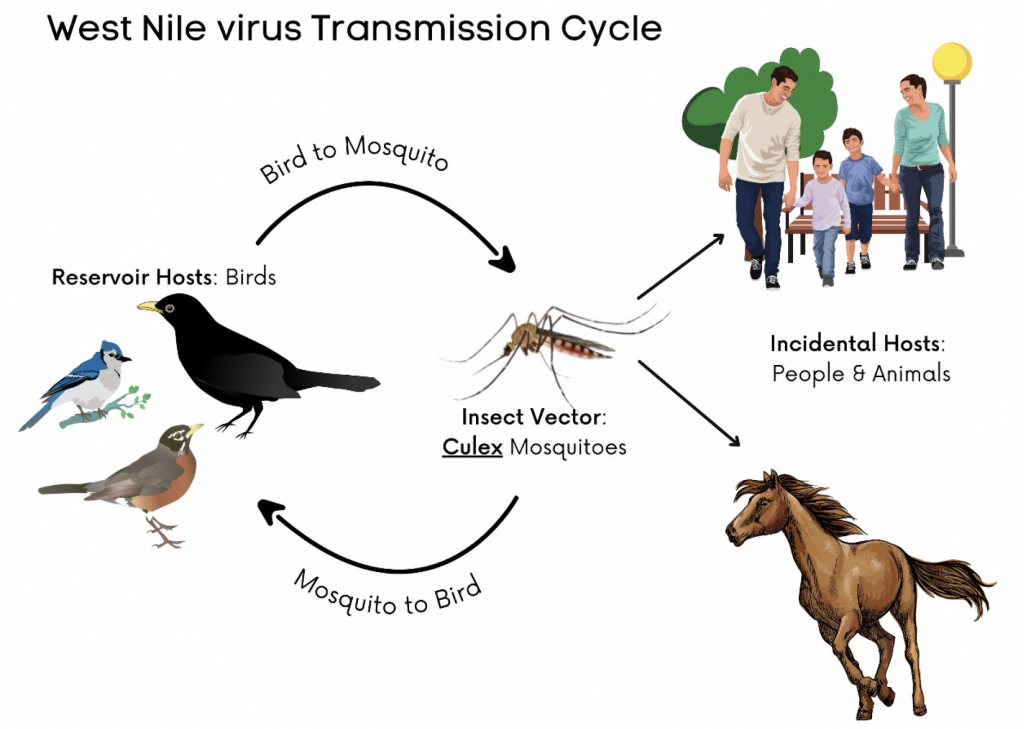RESOURCES
West Nile virus is currently the most commonly transmitted vector born virus in Canyon County.

West Nile virus (WNv) is most commonly transmitted to people by the bite of an infected mosquito. Mosquitoes become infected when they feed on infected birds. WNv can cause serious illness in people of any age, but especially in people over the age of 50 or those with other underlying medical conditions.
WNv can also be transmitted to horses, causing serious illness, and, in some cases, death. You can protect your horse with yearly vaccinations available from a veterinarian or your local feed and tack store.
Clean your horse trough’s water once a week to prevent mosquito production.
Avoid mosquito bites by following the 3D’s of Mosquito Control:
Drain all standing water on or near your property once a week.
Dress in light colored clothing that covers your skin when outdoors.
Defend yourself and loved ones by using an EPA-approved repellent such as:
- Deet
- Picaridin
- Oil of lemon-eucalyptus
- IR3535
Always read all label directions and make sure to assist children in the application of bug repellant.
It is possible to generate large amounts of mosquitoes around the home with small amounts of water. Mosquitoes can have many generations in one year, and in the heat of summer, they can emerge from egg to adult in about a week.
The northern house mosquito, Culex pipiens, is the most common mosquito found around the home and is a primary carrier of West Nile virus. This mosquito will lay its eggs in any receptacle containing water rich in decomposing organic material such as discarded tires, unwashed bird baths, clogged rain gutters and plastic wading pools allowed to stagnate through disuse. The best way to prevent mosquito production is to remove any objects that hold water from your yard.
Grass clippings, dead leaves, etc. quickly produce a mix that is highly attractive to the female mosquito. Once the water begins to foul, the mosquito will lay eggs in any receptacle containing decaying organic material found on your property.
Avoid Collecting Standing Water
- Rain gutters on houses tend to fill up with leaves and other things that clog the gutters.
- Swimming pools can produce ample mosquitoes to bother a neighborhood. Keep pools full of clean water and clean out algae and leaves. Pool covers can also hold mosquitoes. Some mosquito larvae hatch out in March, so covers should be removed and the pools filled with chlorinated water as soon as practical in the spring.
- Tires are notorious for producing large numbers of mosquitoes. Store tires in a shed or garage. If you have a tire swing, drill a hole in the bottom so it cannot hold water.
- Flower pots and drain dishes underneath the pot can hold enough water to produce mosquitoes.
- Garbage/recycling cans can collect water. Place drainage holes in the bottom of garbage can or recycling container.
- Tarps are used to cover items such as wood, boats, etc. Always keep the tarp tight and drain any water off the tarp. Any depressions in a tarp can hold enough water to produce mosquitoes.
- Boats: The plug in the bottom of the boat should be open so water can drain from it. Store boats in the garage or turn them over so they cannot hold any water.
- Buckets, soda cans, birdbaths, and watering troughs can also collect standing water.
Water Trees, Shrubs, and Lawns Properly
The following schedule is recommended by the University of Idaho in reference to landscape and turf at 1/2 inch of water per irrigation cycle.
April Once every 7 days
May Once every 4 days
June and July Once every 3 days
August Once every 2 days
September Once every 6 days
October Once every 12 days
Over-irrigating can lead to tremendous hatch-offs of mosquitoes that can affect a whole neighborhood. Over-irrigating can also lead to fungal and other plant-related disease or insect problems.
Keep Mosquitoes from Entering Your Home
- Seal gaps and weather-strip doors.
- Repair or replace window screens.
Printable Resource: Mosquito Brochure
Debug The Myths
DEET Online
Using Insect Repellents Safely and Effectively (EPA)
Pest Facts
Reporting Dead Wildlife in Idaho (Idaho Fish and Game
Southwest District Health
West Nile Virus: Fight The Bite (Idaho Department of Health and Welfare)
West Nile Virus Resource Guide (National Pesticide Information Center)
West Nile virus (CDC)
Mosquitoes and Your Community (Southwest District Health)
